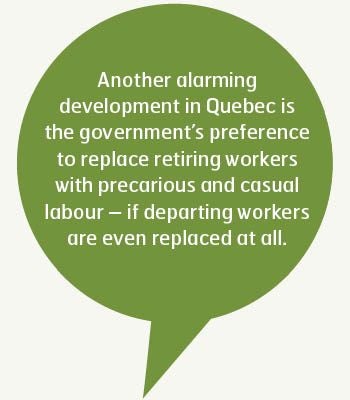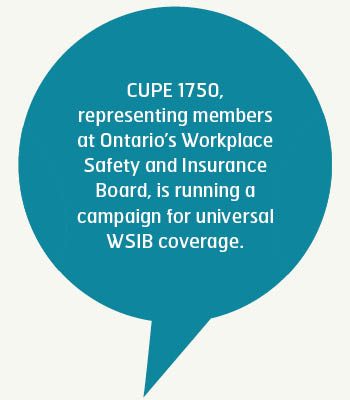This profile is intended to provide CUPE members with basic information about the sector they work in from a national perspective.
The Provincial Government and Crown Corporations Sector council includes CUPE locals whose members bargain with provincial governments and crown corporations. Members work in correctional facilities, casinos, liquor commissions, provincial highways departments, and workers’ compensation systems. CUPE is the major union for direct government employees and provincial crown corporations in New Brunswick and Quebec. In most other provinces, the provincial affiliates of the National Union of Provincial and General Employees (NUPGE) are the predominant unions representing direct government employees. Some CUPE members working for crown corporations are also in the emergency services, energy and social services sectors.

By the numbers
The number of members and locals within this sector varies dramatically by province.
Nova Scotia
1,400 members; one local (provincial highways)
New Brunswick
8,800 members; seven locals (workers’ compensation, liquor, corrections, court stenographers, and rehab and therapy)
Quebec
4,000 members; 17 locals (casinos, liquor, crown corporations)
Ontario
3,500 members; one local (workers’ compensation)
Manitoba
700 members; two locals (workers’ compensation, lotteries)
British Columbia
545 members; one local (crown corporation – BC Assessment)
Saskatchewan
165 members; two locals (crown corporations–Sask. Human Rights Commission and legal aid)
Newfoundland
27 members; one local (Newfoundland and Labrador Housing crown corporation)
Occupations
The predominant occupations also vary greatly province-to-province due to the diverse range of work and workplaces. In New Brunswick and Nova Scotia for example, the largest number of members work in general labour and trades on provincial highways. There are, however, also many members in the New Brunswick Liquor Corporation working in warehouses and retail positions.
In Ontario, only one local falls within this sector. CUPE 1750 is comprised of members who work as analysts and specialists, psychologists, social workers, and various other positions for the Workplace Safety and Insurance Board.
Most of our members in Quebec are casino workers.
In BC, where only CUPE 1767 falls within this sector, appraisers and administrators are the predominant occupations. In both Newfoundland and Labrador and Manitoba, the predominant occupations are in administration.
In Saskatchewan, the two small locals represent lawyers and staff at the Saskatchewan Human Rights Commission (CUPE 1871) and the Saskatchewan Legal Aid Commission (CUPE 1949).
Issues
All of the locals in this sector bargain directly with the provincial government or their respective employer. Although the type of work members do in this sector varies greatly, there are some common issues that face all workers within this sector.
Privatization
Almost every provincial government is talking about whether to privatize its largest assets.
Privatization is a major issue facing many locals within the Provincial Government and Crown Corporations Sector.
In New Brunswick, CUPE 963 (liquor store workers) is fighting against the proliferation of private liquor stores known as agency stores, which initially were intended to service only small, rural areas that could not support a stand-alone liquor store, but are now popping up along highways. Workers in these agency stores are non-union, and often work for minimum wage. The New Brunswick government has raised the population cut-off for public stores, allowing larger communities to utilize these private agency liquor stores. Ongoing talk of expanding the sale of beer and wine to grocery stores is also a threat.
The debate over privatization of some crown corporations could become a reality with the prevailing austerity climate in Quebec, especially with the recent election of a majority Liberal government and a significant number the Coalition Avenir Québec members to the Quebec National Assembly. Legislation has recently been introduced to privatize 10 per cent of public liquor stores in the province. CUPE 3535 members were already affected by privatization legislation in 2006 when the liquor bottling component of the Société des Alcools du Quebéc (SAQ) was sold off to a private company. Although workers in the bottling component continue to be CUPE members, working conditions have deteriorated and there is less job security.
Highway workers in both New Brunswick and Nova Scotia (CUPE 1190 and CUPE 1867) are also rallying against privatization. In New Brunswick, the government has turned to public-private partnerships (P3s) to build the highway between Moncton and Fredericton. In Nova Scotia, after successfully contracting in services at an asphalt sealing plant and a chip sealing crew, the new Liberal government announced in Fall 2013 that these services were once again to be contracted out.
Attacks on wages
Members in this sector are facing attacks on wages and benefits in bargaining. In BC, CUPE 1767, representing workers at crown corporation BC Assessment, is faced with a government mandate that restricts the wage increases that can be negotiated.
In New Brunswick, many of the locals in this sector fall under the Civil Service Act which dictates their terms and conditions of employment, and subjects them to special rules around hiring and seniority. With respect to wages, the New Brunswick government legislated zero per cent wage increases for two years across the public sector.
In Nova Scotia, the newly-elected Liberal government has told public sector workers to expect no pay increases in the upcoming round of bargaining.
In Quebec, the government recently raised the target for the economic dividend, meaning that if the government experiences any drop in revenue from what was projected, there will be no bonuses as promised in the last round of bargaining for SAQ employees. Prior to this change, bonuses would be granted, so long as the actual revenue was at least 94 per cent of the target. This change was introduced unilaterally, and in violation of a 2009 agreement.

Another alarming development in Quebec is the government’s preference to replace retiring workers with precarious and casual labour – if departing workers are even replaced at all.
A similar situation exists in Nova Scotia, were the collective agreement contains no minimum staffing levels or job security against contracting out. CUPE 1867 has seen a trend towards using precarious and casual employees instead of posting full-time positions.
Bargaining
Many of the locals within this sector are presently in, or preparing for, bargaining. An issue unique to members working in corrections in New Brunswick is the lack of binding interest arbitration. There is a very high number of corrections workers designated as essential services. This makes any strike action ineffective. And without binding interest arbitration, it is very difficult to settle collective bargaining. CUPE 1251 has been without a contract for three years as a result. Nova Scotia highway workers are subject to the Provincial Highway Workers Bargaining Act, which completely restricts their right to strike. It does, however, provide for access to binding interest arbitration to resolve bargaining impasse.
Pensions
CUPE is working with other unions in several provinces to maintain defined benefit plans.
Most, if not all, members in this sector have pensions. In New Brunswick, CUPE 1190, 1251, 1840 and 1418 were all recently legislated into a so-called ‘shared risk’ pension plan. Previously, these members all had defined benefit plans under the Public Service Super Annuation Act. In addition, changes to the Pension and Benefits Act stripped locals of their right to bargain pension improvements. These changes were made without negotiation or consultation, and CUPE is presently challenging the legality of this attack on pensions in court.
Success stories
Highway Complaints Hotline
CUPE 1190 recently ran a successful campaign against cutbacks to road maintenance by the New Brunswick government. A complaints hotline was set up where the public could call with complaints about the provincial highway conditions. Although it remains to be seen whether any improvements to road conditions will result, the campaign successfully raised the profile of the issue and CUPE in the community.
Pay Equity
CUPE 1840, representing stenographers in New Brunswick courts, just completed a long, arduous pay equity process that has brought some positive results for members. The resulting pay increases, however, are presently before the province’s Board of Management and there is a fear the increases will be delayed.

Universal WSIB Coverage - It’s Time
CUPE 1750, representing members at Ontario’s Workplace Safety and Insurance Board, is running a campaign for universal WSIB coverage. Ontario’s economy is changing with new industries, many of which are not covered by WSIB. Ontario presently ranks the lowest in Canada with only 70 to 72 per cent of the workforce covered by the provincial workers’ compensation system, leaving1.8 million workers in Ontario uncovered by WSIB. CUPE 1750 is raising awareness of this issue, and lobbying the provincial government for much needed changes to the system.
Future of the sector
CUPE Provincial Government and Crown Corporations members continue to face challenges under current and ever-changing provincial governments. The Quebec’s government plan to sell off public assets and crown corporations, and the New Brunswick government’s loosening of restrictions against private liquor stores, and Governments’ increased reliance on P3s for provincial highway and other sub-sectors such as corrections, all have the potential to detrimentally impact CUPE members in the sector and the people who depend on the services they provide.

